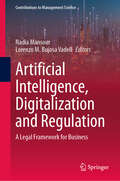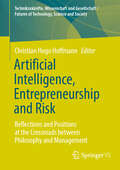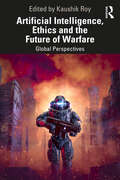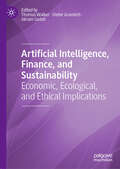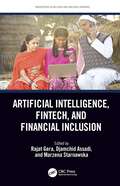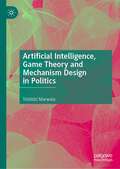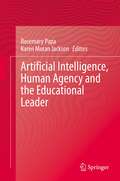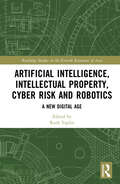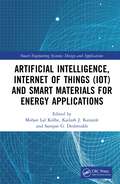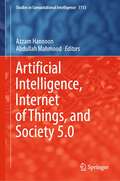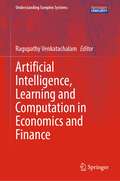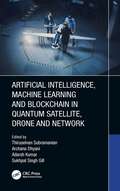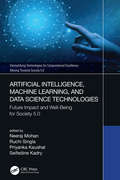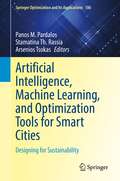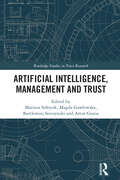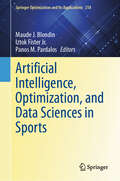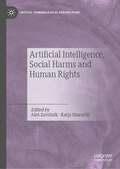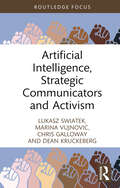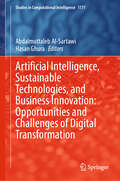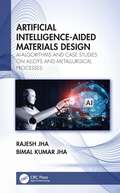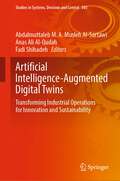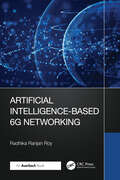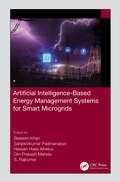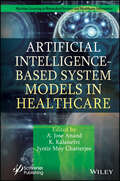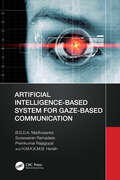- Table View
- List View
Artificial Intelligence, Digitalization and Regulation: A Legal Framework for Business (Contributions to Management Science)
by Nadia Mansour Lorenzo M. Bujosa VadellThis edited volume explores the relationship between Artificial intelligence (AI), business performance, and regulation. Artificial intelligence allows entrepreneurs to create universally transferable platforms and customers to find the offer they want. Indeed, AI is an excellent tool for competitiveness and innovation. It can contribute to a positive business performance by reducing costs, analyzing and exploiting data, optimizing marketing strategy and advertising targeting, and improving the customer experience. However, Artificial intelligence can also generate threats such as disinformation, manipulation, and false content. Companies are increasingly becoming obliged to take security measures to protect digital data against cyber-attacks and data leaks. This volume presents concepts and solutions for companies aiming not only to benefit from the newest technological developments in AI but also interested in tackling the challenges that come with the use of these technologies.
Artificial Intelligence, Entrepreneurship and Risk: Reflections and Positions at the Crossroads between Philosophy and Management (Technikzukünfte, Wissenschaft und Gesellschaft / Futures of Technology, Science and Society)
by Christian Hugo HoffmannThis book embarks on a thought-provoking journey that seeks to illuminate the intricate connections between the dynamic realms of AI, Entrepreneurship and Risk Management. This book illuminates the philosophical foundations of AI, examines the fundamental beliefs surrounding AI's nature, and its effects for the human condition. Drawing on the works of eminent philosophers, economists and business leaders alike, the authors of this volume engage in inspirational discussions on ethics, philosophy of technology, and the potential societal ramifications of advancing AI technologies. By grounding the exploration in philosophical reflections, the authors set the stage for a comprehensive understanding of AI's role in entrepreneurship and the inherent risks it entails.
Artificial Intelligence, Ethics and the Future of Warfare: Global Perspectives
by Kaushik RoyThis volume examines how the adoption of AI technologies is likely to impact strategic and operational planning, and the possible future tactical scenarios for conventional, unconventional, cyber, space and nuclear force structures. In addition to developments in the USA, Britain, Russia and China, the volume also explores how different Asian and European countries are actively integrating AI into their military readiness. It studies the effect of AI and related technologies in training regimens and command structures. The book also covers the ethical and legal aspects of AI augmented warfare.The volume will be of great interest to scholars, students and researchers of military and strategic studies, defence studies, artificial intelligence and ethics.
Artificial Intelligence, Finance, and Sustainability: Economic, Ecological, and Ethical Implications
by Thomas Walker Dieter Gramlich Akram SadatiAs the world increasingly recognizes the importance of sustainability, businesses and investors are looking for ways to integrate sustainable practices into their operations and investment decisions. At the same time, advancements in artificial intelligence (AI) and technology are transforming the finance industry and are enabling more data-driven decision-making. The intersection of these fields presents a significant opportunity to accelerate progress towards a more sustainable future, while also improving financial performance. This book explores the crucial role of AI in sustainability and finance, examining how financial technologies and machine learning are shaping the approach of finance professionals towards environmental, social, and governance (ESG) issues. It provides a comprehensive and integrated perspective on how these areas are becoming increasingly intertwined and examines the ethical and social implications of AI in finance and its potential to unlock new opportunities for sustainability. By focusing on the practical implications of these intersections and including both case studies and expert analysis, the book provides valuable insights for practitioners, policymakers, academics, and students alike.
Artificial Intelligence, Fintech, and Financial Inclusion (Innovations in Big Data and Machine Learning)
by Djamchid Assadi Rajat Gera Marzena StarnawskaThis book covers big data, machine learning, and artificial intelligence-related technologies and how these technologies can enable the design, development, and delivery of customer-focused financial services to both corporate and retail customers, as well as how to extend the benefits to the financially excluded sections of society.Artificial Intelligence, Fintech, and Financial Inclusion describes the applications of big data and its tools such as artificial intelligence and machine learning in products and services, marketing, risk management, and business operations. It also discusses the nature, sources, forms, and tools of big data and its potential applications in many industries for competitive advantage. The primary audience for the book includes practitioners, researchers, experts, graduate students, engineers, business leaders, and analysts researching contemporary issues in the area.
Artificial Intelligence, Game Theory and Mechanism Design in Politics
by Tshilidzi MarwalaThis book explores how AI and mechanism design can provide a new framework for international politics. The international political system is all manners in which countries, governments and people relate. Mechanism design in international politics relates to identifying rules that define relationships between people and countries that achieve a particular outcome, e.g., peace or more trade or democracy or economic development. Artificial intelligence is technique of making machines intelligent. This book explores mechanism design and artificial intelligence in international politics and applies these technologies to politics, economy and society. This book will be of interest to scholars of international relations, politics, sustainable development, and artificial intelligence.
Artificial Intelligence, Human Agency and the Educational Leader
by Rosemary Papa Karen Moran JacksonThis book includes contributions by scholars from a variety of disciplines, the dialogue and discourse on how AI (artificial intelligence) development includes and/or excludes pedagogical educational learning theories focused on the learner. A call from Educational Leaders Without Borders (ELWB) was issued to scholars from across the globe who were asked to write a vignette described as an evocative description or account on how education leaders envision education in 2051 and A.I. beyond mere product purchase. These vignettes should engage us in questions as to how the development and use of AI technologies are shaped. As educators who believe education should be established on social justice beliefs and practices, our review of literature shows there are no books addressing the complexities of A.I. development and the role of educators. The futuristic element is unique in its approach to imagine a socially just better world in which to inspire educators. This unique feature encourages creativity in how one addresses the call to imagine a future world and our role as educators in that world.
Artificial Intelligence, Intellectual Property, Cyber Risk and Robotics: A New Digital Age (Routledge Studies in the Growth Economies of Asia)
by Ruth TaplinArtificial Intelligence (AI) is the most rapidly developing technology in the current Digital Age, but it is also the least defined, understood and adequately explained technological advance. This book brings together a group of leading experts who assess different aspects of AI from different disciplinary perspectives. The book argues that robots are not living systems but the creations of humans who must ultimately be accountable for the actions of the robots that they have invented. Robots do not have ownership entitlement. The book uses Intellectual Property Rights cases, evidence from roboticists, cybersecurity experts, Patent Court judges, technology officers, climate change scientists, economists, physicists and those from the legal profession to demonstrate that while AI can have very beneficial uses for many aspects of human economy and society, robots are not living systems autonomous from human decision making. This book will be useful to those in banking and insurance, cybersecurity, lawyers, judges, technology officers, economists, scientist inventors, computer scientists, large and small companies and postgraduate students.
Artificial Intelligence, Internet of Things (Smart Engineering Systems)
by Lal Kolhe MohanThis reference text offers the reader a comprehensive insight into recent research breakthroughs in blockchain, the Internet of Things (IoT), artificial intelligence and material structure and hybrid technologies in their integrated platform, while also emphasizing their sustainability aspects. The text begins by discussing recent advances in energy materials and energy conversion materials using machine learning, as well as recent advances in optoelectronic materials for solar energy applications. It covers important topics including advancements in electrolyte materials for solid oxide fuel cells, advancements in composite materials for Li-ion batteries, progression of materials for supercapacitor applications, and materials progression for thermochemical storage of low-temperature solar thermal energy systems. This book: Discusses advances in blockchain, the Internet of Things, artificial intelligence, material structure and hybrid technologies Covers intelligent techniques in materials progression for sensor development and energy material characterization using signal processing Examines the integration of phase change materials in construction for thermal energy regulation in new buildings Explores the current happenings in technology in conjunction with basic laws and mathematical models Connecting advances in engineering materials with the use of smart techniques including artificial intelligence, machine learning and Internet of Things (IoT) in a single volume, this text will be especially useful for graduate students, academic researchers and professionals in the fields of electrical engineering, electronics engineering, materials science, mechanical engineering and computer science.
Artificial Intelligence, Internet of Things, and Society 5.0 (Studies in Computational Intelligence #1113)
by Azzam Hannoon Abdullah MahmoodThis book unlike any other previous book provides a platform for scholars and researchers to present the latest insights and findings on the application of artificial intelligence and other sustainable technologies for a human-centric society. It brings together technology with society with special attention given to AI and IoT-related intricacies for a digital economy. It covers a variety of research topics including block ciphers, network marketing for sustainability entrepreneurship and AI, AI and stock trading decisions, digital transformation, knowledge management, chatbot engineering, cybersecurity, and smart metering system. The book is a comprehensive reference work for scholars, academics, policymakers, students, and professionals presenting an overall understanding of AI, its present and future trends, and presents a discourse on important policies and strategies on inclusivity, diversity, bias, accountability, security, metaverse applications of AI, and other technologies such as IoT.
Artificial Intelligence, Learning and Computation in Economics and Finance (Understanding Complex Systems)
by Ragupathy VenkatachalamThis book presents frontier research on the use of computational methods to model complex interactions in economics and finance. Artificial Intelligence, Machine Learning and simulations offer effective means of analyzing and learning from large as well as new types of data. These computational tools have permeated various subfields of economics, finance, and also across different schools of economic thought. Through 16 chapters written by pioneers in economics, finance, computer science, psychology, complexity and statistics/econometrics, the book introduces their original research and presents the findings they have yielded.Theoretical and empirical studies featured in this book draw on a variety of approaches such as agent-based modeling, numerical simulations, computable economics, as well as employing tools from artificial intelligence and machine learning algorithms. The use of computational approaches to perform counterfactual thought experiments are also introduced, which help transcend the limits posed by traditional mathematical and statistical tools.The book also includes discussions on methodology, epistemology, history and issues concerning prediction, validation, and inference, all of which have become pertinent with the increasing use of computational approaches in economic analysis.
Artificial Intelligence, Machine Learning and Blockchain in Quantum Satellite, Drone and Network
by Adarsh Kumar Sukhpal Singh Gill Thiruselvan Subramanian Archana DhyaniQuantum computing is a field in which advanced technologies like quantum communication, artificial intelligence and machine learning can be used to secure and speed up connectivity using quantum computers, quantum drones or quantum satellites. This book serve as a foundation for researchers and scientists in this field. Future technologies, such as quantum drone delivery systems, quicker internet and climate change mitigation, will need quantum information processing and quantum computation. This book deeply explores the importance of quantum computing in real-time applications. It may be used as a reference book for students in higher education, including undergraduate and graduate students, as well as researchers. Key features: Provides a clear insight into the Internet of Drones for academicians, postdoc fellows, research scholars, graduate and postgraduate students, industry fellows and software engineers Useful to professionals who seek information about the Internet of Drones, including experts in quantum computing and physics and post-quantum cryptography, as well as data scientists and data analysts Covers quantum computing and security for Unmanned Aerial Vehicles (UAV) or drones which are widely useful for applications such as military, government, and non-government systems Explores futuristic aspects of the Intenet of Drones to improve everyday living for ordinary people
Artificial Intelligence, Machine Learning, and Data Science Technologies: Future Impact and Well-Being for Society 5.0 (Demystifying Technologies for Computational Excellence)
by Neeraj MohanThis book provides a comprehensive, conceptual, and detailed overview of the wide range of applications of Artificial Intelligence, Machine Learning, and Data Science and how these technologies have an impact on various domains such as healthcare, business, industry, security, and how all countries around the world are feeling this impact. The book aims at low-cost solutions which could be implemented even in developing countries. It highlights the significant impact these technologies have on various industries and on us as humans. It provides a virtual picture of forthcoming better human life shadowed by the new technologies and their applications and discusses the impact Data Science has on business applications. The book will also include an overview of the different AI applications and their correlation between each other. The audience is graduate and postgraduate students, researchers, academicians, institutions, and professionals who are interested in exploring key technologies like Artificial Intelligence, Machine Learning, and Data Science.
Artificial Intelligence, Machine Learning, and Optimization Tools for Smart Cities: Designing for Sustainability (Springer Optimization and Its Applications #186)
by Panos M. Pardalos Stamatina Th. Rassia Arsenios TsokasThis volume offers a wealth of interdisciplinary approaches to artificial intelligence, machine learning and optimization tools, which contribute to the optimization of urban features towards forming smart, sustainable, and livable future cities.Special features include:New research on the design of city elements and smart systems with respect to new technologies and scientific thinkingDiscussions on the theoretical background that lead to smart cities for the futureNew technologies and principles of research that can promote ideas of artificial intelligence and machine learning in optimized urban environmentsThe book engages students and researchers in the subjects of artificial intelligence, machine learning, and optimization tools in smart sustainable cities as eminent international experts contribute their research results and thinking in its chapters. Overall, its audience can benefit from a variety of disciplines including, architecture, engineering, physics, mathematics, computer science, and related fields.
Artificial Intelligence, Management and Trust (Routledge Studies in Trust Research)
by Mariusz Sołtysik Magda Gawłowska Bartlomiej Sniezynski Artur GuniaThe main challenge related to the development of artificial intelligence (AI) is to establish harmonious human-AI relations, necessary for the proper use of its potential. AI will eventually transform many businesses and industries; its pace of development is influenced by the lack of trust on the part of society. AI autonomous decision-making is still in its infancy, but use cases are evolving at an ever-faster pace. Over time, AI will be responsible for making more decisions, and those decisions will be of greater importance. The monograph aims to comprehensively describe AI technology in three aspects: organizational, psychological, and technological in the context of the increasingly bold use of this technology in management. Recognizing the differences between trust in people and AI agents and identifying the key psychological factors that determine the development of trust in AI is crucial for the development of modern Industry 4.0 organizations. So far, little is known about trust in human-AI relationships and almost nothing about the psychological mechanisms involved. The monograph will contribute to a better understanding of how trust is built between people and AI agents, what makes AI agents trustworthy, and how their morality is assessed. It will therefore be of interest to researchers, academics, practitioners, and advanced students with an interest in trust research, management of technology and innovation, and organizational management.
Artificial Intelligence, Optimization, and Data Sciences in Sports (Springer Optimization and Its Applications #218)
by Panos M. Pardalos Iztok Fister Jr. Maude J. BlondinThis book delves into the dynamic intersection of data science, data mining, machine learning, and optimization within sports. It compiles and presents the latest achievements in this vibrant and emerging research area, offering a comprehensive overview of how these technologies revolutionize sports analytics and performance. Topical coverage includes artificial intelligence in sports, automated machine learning for training sessions, computational social science, and deep learning applications. Readers will also explore cutting-edge concepts such as digital twins in sports and sports prediction through data analysis. This volume highlights theoretical advancements and practical case studies that demonstrate real-world applications. Ideal for researchers, practitioners, and students in fields related to sports science, data analytics, and machine learning, this book serves as a crucial resource for anyone looking to understand the transformative impact of technology on sports. Whether you are an academic scholar or a professional working in the industry, this collection offers valuable insights that bridge the gap between research and practical solutions.
Artificial Intelligence, Social Harms and Human Rights (Critical Criminological Perspectives)
by Aleš Završnik Katja SimončičThis book critically explores how and to what extent artificial intelligence (AI) can infringe human rights and/or lead to socially harmful consequences and how to avoid these. The European Union has outlined how it will use big data, machine learning, and AI to tackle a number of inherently social problems, including poverty, climate change, social inequality and criminality. The contributors of this book argue that the developments in AI must take place in an appropriate legal and ethical framework and they make recommendations to ensure that harm and human rights violations are avoided. The book is split into two parts: the first addresses human rights violations and harms that may occur in relation to AI in different domains (e.g. border control, surveillance, facial recognition) and the second part offers recommendations to address these issues. It draws on interdisciplinary research and speaks to policy-makers and criminologists, sociologists, scholars in STS studies, security studies scholars and legal scholars.
Artificial Intelligence, Strategic Communicators and Activism (Global PR Insights)
by Marina Vujnovic Dean Kruckeberg Lukasz Swiatek Chris GallowayIn a world that is increasingly wary of artificial intelligence (AI), this book explores the pressing need for strategic communicators to move away from being advocates for AI and move towards a more critical activist role that enables them to counter AI-driven threats to communities and relationships. AI is contributing to inequality, misinformation and environmental damage, among other problems. This book argues that strategic communicators are uniquely placed to help counter AI-driven challenges because of their skills in relationship-building and their ability to craft and deliver messages effectively. By discussing the different professional activist approaches that communicators can take in relation to growing AI challenges, the book offers multiple perspectives that will help to build knowledge in diverse settings and develop practice, especially in community and activist strategic communication. Research-based and combining theory with practice, this thought-provoking book will be welcomed by strategic communication scholars and practitioners alike eager to develop a critical approach to the challenges surrounding AI.
Artificial Intelligence, Sustainable Technologies, and Business Innovation: Opportunities and Challenges of Digital Transformation (Studies in Computational Intelligence #1171)
by Abdalmuttaleb Al-Sartawi Hasan GhuraThis book offers a comprehensive exploration of the symbiotic relationship between artificial intelligence, sustainable technologies, and business innovation. Innovation has always been the main engine of an improved standard of living throughout history. However, the process of innovation can be highly disruptive as it makes more conventional technologies obsolete This book presents trendy and important topics such as open innovation and sustainability of Islamic Banks, Fintech, financial inclusion, IOT, business intelligence capabilities, innovation through AI, circular economy practices, and trends in cybersecurity. The reader-base from diverse backgrounds, including scholars, industry experts, policymakers, and students, engage with the perspectives and topics discussed in this book. By understanding the opportunities and challenges of this dynamic landscape, the authors can collectively work together to shape a future where technology and sustainability co-exist to drive positive change.
Artificial Intelligence-Aided Materials Design: AI-Algorithms and Case Studies on Alloys and Metallurgical Processes
by Rajesh Jha Bimal Kumar JhaThis book describes the application of artificial intelligence (AI)/machine learning (ML) concepts to develop predictive models that can be used to design alloy materials, including hard and soft magnetic alloys, nickel-base superalloys, titanium-base alloys, and aluminum-base alloys. Readers new to AI/ML algorithms can use this book as a starting point and use the MATLAB® and Python implementation of AI/ML algorithms through included case studies. Experienced AI/ML researchers who want to try new algorithms can use this book and study the case studies for reference. Offers advantages and limitations of several AI concepts and their proper implementation in various data types generated through experiments and computer simulations and from industries in different file formats Helps readers to develop predictive models through AI/ML algorithms by writing their own computer code or using resources where they do not have to write code Covers downloadable resources such as MATLAB GUI/APP and Python implementation that can be used on common mobile devices Discusses the CALPHAD approach and ways to use data generated from it Features a chapter on metallurgical/materials concepts to help readers understand the case studies and thus proper implementation of AI/ML algorithms under the framework of data-driven materials science Uses case studies to examine the importance of using unsupervised machine learning algorithms in determining patterns in datasets This book is written for materials scientists and metallurgists interested in the application of AI, ML, and data science in the development of new materials.
Artificial Intelligence-Augmented Digital Twins: Transforming Industrial Operations for Innovation and Sustainability (Studies in Systems, Decision and Control #503)
by Abdalmuttaleb M. A. Musleh Al-Sartawi Anas Ali Al-Qudah Fadi ShihadehPresently, we stand on the threshold of a technological revolution that will drastically change the way we live, work, and communicate with each other. By the current rate, scope, and complexity, this transformation will be as fundamental for society as any other technological paradigm change from the past. The industries which are more susceptible to change are technologically oriented industries including banking, finance, accounting, and auditing. One of the technological concepts of the technological revolution is the concept of the digital twin.The application of digital twins and AI as paired with Internet of Things technologies makes it possible to solve ESG problems on a completely different level (Li, 2019) for accounting firms and financial institutions. These include recycling on demand, rational energy consumption, smart surveillance cameras for crime tracking, and smart branch parking solutions, monitoring the wear and tear and conditions of financial technology infrastructures.Moreover, numerous researchers and practitioners emphasize the significance of innovating sustainable business models and operations (Geissdoerfer et al., 2018). The digital twin will allow businesses and financial institutions to minimize costs, boost customer service, and find new ways to generate revenue. DTW is accessible now more than ever, and many reputable and innovative companies such as Tesla, Ericsson, and Siemens have adopted it with varying success.Therefore, this book examines the opportunities, challenges, and risks of artificial intelligence-augmented digital twins for financial operations, innovation, and sustainable development. It focuses on AI and digital twin technologies to furnish solutions for the current industrial revolution including the Metaverse. Henceforth, this book aims to encourage authors to submit multi-disciplinary chapters indicating the current scholarly challenges about the applications and potential of artificial intelligence and digital twins in accounting, finance, and banking.
Artificial Intelligence-Based 6G Networking
by Radhika Ranjan RoyArtificial Intelligence-Based 6G Networking focuses exclusively on the upcoming sixth-generation (6G) network and services slated for implementation by 2030. It explores the paradigm shift that is 6G. It discusses the deep integration of computing and communication, supported by artificial intelligence (AI) across network elements like cloud, edge, and terminals. It also examines how AI-native interfaces will permeate various network components, from radio access networks to application servers and databases.Proposing a unified AI-enabled framework for optimizing networks and applications as a single integrated system, the book covers how network service providers can tailor network baselines, reduce noise, and accurately identify issues. The book delves into the potential of AI-driven networks to self-correct, predict, and rectify service degradations proactively, enhancing uptime and troubleshooting efficiency. It outlines the “Connection, Communication, Collaboration, Curation, and Community” framework to enhance network effects, aiding operators in automation, cost reduction, and providing optimal user experiences.Covering topics from MIMO and Massive MIMO to holographic communications, cybersecurity and quantum communications, the book explores cutting-edge technologies shaping the future of 6G networks. It anticipates a future where AI, along with machine learning and deep learning, enables continuous learning, self-optimization, and predictive maintenance, even with full automation, that will be the hallmark of a new era in network connectivity and innovation.
Artificial Intelligence-Based Energy Management Systems for Smart Microgrids
by Baseem KhanModeling and optimization of energy management systems for micro- and mini-grids play an important role in the fields of energy generation dispatch, system operation, protection coordination, power quality issues, and peak demand conflict with grid security. This comprehensive reference text provides an in-depth insight into these topics. This text discusses the use of meta-heuristic and artificial intelligence algorithms for developing energy management systems with energy use prediction for mini- and microgrid systems. It covers important concepts including modeling of microgrid and energy management systems, optimal protection coordination-based microgrid energy management, optimal energy dispatch with energy management systems, and peak demand management with energy management systems. Key Features: Presents a comprehensive discussion of mini- and microgrid concepts Discusses AC and DC microgrid modeling in detail Covers optimization of mini- and microgrid systems using AI and meta-heuristic techniques Provides MATLAB®-based simulations on a mini- and microgrid Comprehensively discussing concepts of microgrids with the help of software-based simulations, this text will be useful as a reference text for graduate students and professionals in the fields of electrical engineering, electronics and communication engineering, renewable energy, and clean technology.
Artificial Intelligence-Based System Models in Healthcare
by K. Kalaiselvi A. Jose Anand Jyotir Moy ChatterjeArtificial Intelligence-Based System Models in Healthcare provides a comprehensive and insightful guide to the transformative applications of AI in the healthcare system. This book is a groundbreaking exploration of the synergies between artificial intelligence and healthcare innovation. In an era where technological advancements are reshaping the landscape of medical practices, this book provides a comprehensive and insightful guide to the transformative applications of AI in healthcare systems. From conceptual foundations to practical implementations, the book serves as a roadmap for understanding the intricate relationships between AI-based system models and the evolution of healthcare delivery. The first section delves into the fundamental role of technology in reshaping the healthcare landscape. With a focus on daily life activities, decision support systems, vision-based management, and semantic frameworks, this section lays the groundwork for understanding the pivotal role of AI in revolutionizing traditional healthcare approaches. Each chapter offers a unique perspective, emphasizing the intricate integration of technology into healthcare ecosystems. The second section takes a deep dive into specific applications of AI, ranging from predictive analysis and machine learning to deep learning, image analysis, and biomedical text processing. With a focus on decision-making support systems, this section aims to demystify the complex world of AI algorithms in healthcare, offering valuable insights into their practical implications and potential impact on patient outcomes. The final section addresses the modernization of healthcare practices and envisions the future landscape of AI applications. From medical imaging and diagnostics to predicting ventilation needs in intensive care units, modernizing health record maintenance, natural language processing, chatbots for medical inquiries, secured health insurance management, and glimpses into the future, the book concludes by exploring the frontiers of AI-driven healthcare innovations. Audience This book is intended for researchers and postgraduate students in artificial intelligence and the biomedical and healthcare sectors. Medical administrators, policymakers and regulatory specialists will also have an interest.
Artificial Intelligence-Based System for Gaze-Based Communication
by Premkumar Rajagopal B.G.D.A. Madhusanka Sureswaran Ramadass H.M.K.K.M.B. HerathThis book focuses on the artificial neural network-based system for gaze-based communication. It covers the feasible and practical collaboration of human–computer interaction (HCI) in which a user can intuitively express tasks using gaze-based communication. It will target the vast applications of gaze-based communication using computer vision, image processing, and artificial intelligence.Artificial Intelligence-Based System for Gaze-Based Communication introduces a novel method to recognize the implicit intention of users by using nonverbal communication in combination with computer vision technologies. A novel HCI framework is developed to enable implicit and intuitive gaze-based intention communications. This framework allows the users to intuitively express their intention using natural gaze cues. The book also focuses on robot caregiving technology, which can understand the user’s intentions using minimal interactions with the user. The authors examine gaze-based tracking applications for the assisted living of elderly people. The book examines detailed applications of eye-gaze communication for real-life problems. It also examines the advantages that most people can handle gaze-based communications because it requires very little effort, and most of the elderly and impaired can retain visual capability.This book is ideally designed for students, researchers, academicians, and professionals interested in exploring and implementing gaze-based communication strategies and those working in the field of computer vision and image processing.
